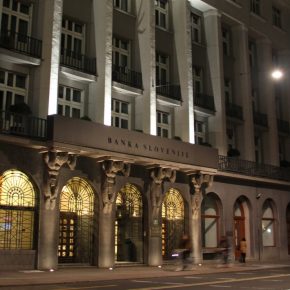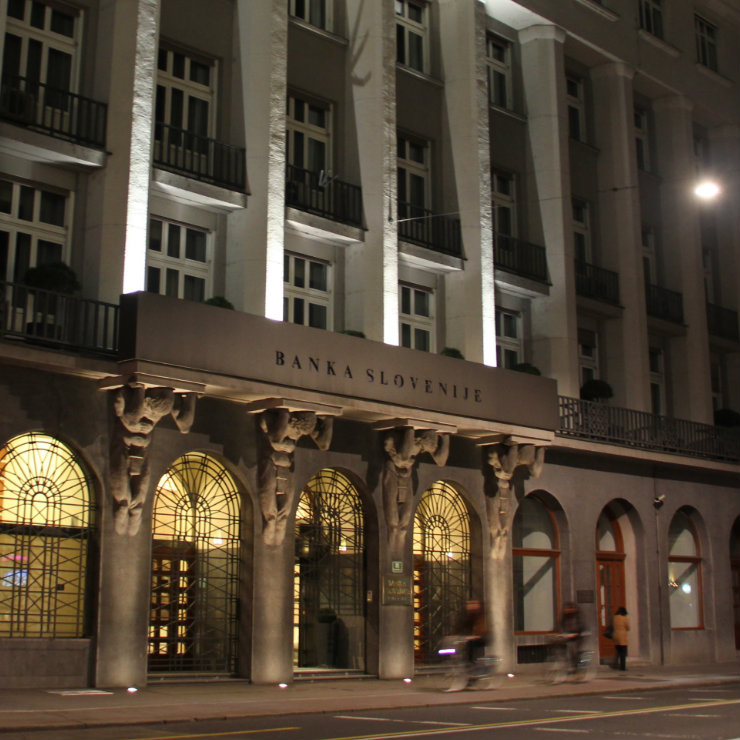Tydzień w gospodarce
Category: Trendy gospodarcze

Slovenia's central bank, Ljubljana, Slovenia (Druh Scoff, CC BY-NC)
It was July, and the special state prosecution team notified the Governor that the Bank was “under investigation for possible “criminal abuse of office” in a 2013 bank overhaul,” reported Reuters. The European Central Bank regarded the police raid unlawful due to their seizure of the ECB documents, and implied the Ljubljana’s move as a threat towards the independence of the central bank in general.
Surely, this is an incident from a small Member State whose monetary policy making capacity was already transferred to the ECB. At the same time, the Bank of Slovenia is a ‘national voice’ within the Eurosystem – it is a macroeconomic observatory for Central and South-east Europe, and retains authority over banking supervision in Slovenia alongside the ECB. As Slovenia aims to recover from the global financial crisis, the Bank functions as the gatekeeper of sustainability, keeping an eye on the neighboring Croatia, Italy and Greece. While it has a point that the Bank’s technocrats must be accountable to the citizens and that the parliamentarians may echo the will of the people, inappropriate ‘checks and balances’ mechanisms infringe the Bank’s independence and undermine the prospects for effective macro-prudential governance.
The bank overhaul referred in the above investigation was one of the first ‘bail-ins’ within the Eurosystem. By sharing the burden with the borrower’s creditors, the bail-in aimed to reduce the costs to taxpayers of rescuing troubled banks. In late 2013, the Bank of Slovenia forced the private shareholders and subordinated bondholders of predominantly state-owned banks (namely, Nova Ljubljanska Banka (NLB), Nova Kreditna Banka Maribor (NKBM), and Abanka) to write off their debts. The practice was also implemented on smaller privately-owned Probanka and Factor Banka, both placed into liquidation. In 2014, Banka Celje, which was had been co-owned by NLB, was bailed in, and subsequently merged with Abanka. NKBM was sold to the American private equity fund Apollo in 2015. The total of EUR581.5m of subordinated debt was wiped out, in addition to the write-down of EUR1.5bn in equity, according to an official figure. In a country with EUR37bn GDP, this seems extraordinary. However, the state also injected EUR3.2bn to those banks in order to avoid an international bail-out, and the capital shortfall was estimated to reach EUR4.8bn at the time.
The police released a statement accusing the Bank that its measure to terminate the debt obligations resulted in the EUR257m benefits (assumed to be for NLB), while State Prosecutor General Zvonko Fišer rejected the ECB President Mario Draghi’s claim of ‘unlawful’ raid, stating that the Bank’s refusal to submit the requested documents triggered the raid procedure (although the refusal was never recorded). The underlying bail-in case reached the Slovenian Constitutional Court and subsequently referred to the Court of Justice of the European Union. The 2013 overhaul was in fact in accordance with the so-called ‘Banking Communication’ by the European Commission, issued in August 2013, and the CJEU ruled on 19 July 2016 (2 weeks after the police raid) that the bail-in measures stated in the Communication was valid despite the Communication itself was not binding.
The Bank Recovery and Resolution Directive of May 2014 then required Slovenia to apply the bail-in rules by the end of 2014, thus, practically removing the 2014 bail-ins (namely, Banka Celje) out of the above investigation from the viewpoint of EU Law. After being rebuked by the Commission in April 2016, Slovenia passed a law on bank bail-in rules on June 2016, just a few weeks before the police raid. Thus, it is not surprising why the ECB strongly voiced a concern in association with the Commission hours after the raid, as the whole investigation seems to strengthen the anti-banking union rhetoric.
Obviously, the raid is a public stunt, disregarding (or even disrespecting) the consultation mechanisms of the European monetary institutions which the Bank of Slovenia has been following during the aforementioned bail-ins. Governor Jazbec who also sits in the Governing Council of the ECB does not deserve such public humiliation. In fact, his Vice-Governors Janez Fabijan, Darko Bohnec, and Stanislava Zadravec Caprirolo were all denied re-election in the parliament, Fabijan by floor voting and the others during the short-listing process by President Borut Pahor. The war against the central bankers seems to have been declared by the political establishments even prior to the launch of the criminal investigation.
In Slovenia, Governors are nominated by the President of the Republic and elected by the parliament – so the (re-)elections have been highly politicized. In 2001, President Milan Kučan was unable to have Governor France Arhar re-elected as the parliament preferred Mitja Gaspari, a former Minister of Finance. In 2007, Gaspari in turn was refused re-election by the parliament regardless of the then President Janez Drnovšek’s support. Drnovšek then questioned the independence of the Bank as the Governors must praise the parliament for securing the re-election. Marko Kranjc succeeded Gaspari as Governor, but did not seek re-election in 2013. President Pahor’s move to remove Vice-Governors Bohnec and Zadravec Caprirolo from the short-list of nominees in January 2016 was a sign that President was willing to nominate the candidates favored by the parliament in order to secure the support of parliamentary parties in his (yet undeclared) bid for own re-election and to strengthen his office.
Who are exactly behind the Bank of Slovenia investigation is yet to be discovered. The interest groups representing the investors and shareholders are certainly in the play. Finance Minister Dušan Mramor, on the other hand, resigned shortly after the police raid, and joined Draghi in voicing the protest against the investigation. Unfortunately, Draghi has only a limited number of legal remedies to intervene, and the turmoil in Slovenia is likely to spill over until the next year.
Neither the fear of losing subordinated bonds (hence, the credibility in the market) nor the delayed sale of NLB would be more harmful than the threatened independence of the central bank. Moreover, the politicized appointment of its Governors makes the conflict within the parliament as well as between the parliament and the office of the President a negative externality to macro-prudential governance in Slovenia and beyond. As the Banking Union becomes closer to reality (particularly after the Brexit), Slovenia remains Draghi’s another headache.

